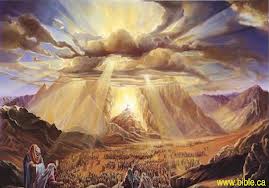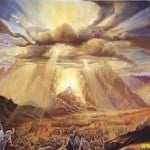2 ) An Egyptian Take on the “New Middle East”
Shavuot occurs on the sixth day of the Hebrew month of Sivan. It marks the conclusion of the Counting of the Omer and is understood to be the day that the Torah was given at Mount Sinai. The date of Shavuot is not explicitly mentioned in the Torah. Yet the date of its occurrence is directly linked to the date of Passover and occurs after the seven-week Counting of the Omer.
To understand this one must remember that the Biblical concept of “time” differs radically from that of the world. “Time” is viewed by the world as a linear line moving from point A to point B. According to such an understanding, time is always moving ahead, leaving the past behind. Time passes us by like a raging river.
Yet in the Jewish and Biblical view of the world, specific dates and appointed times are gates through which time flows in a cyclical and upward spiral fashion, toward a purpose. Time is not a raging river that carries us into the unknown away from our beginnings. It is actually an invitation into an appointed destiny, a Moed. In fact time does not just simply pass us by. The Hebrew word for time ZMAN is related to the Hebrew for invitation, (hazmana or a Zimun). Time does not pass us by it actually beckons us forward.
Furthermore we see that all the Biblical festivals are called Mikraei Kodesh in the Torah,(Leviticus 23:35) . The Baal HaTanya and the Hidushei Harim understand the term” Mikraei Kodesh “literally, to mean a ”Calling of Holiness ”. They understand each festival as a gateway in the passage of time at which we are given the power to “call forth” the specific spark of spirituality and holiness ensconced within this appointed time. The special mitzvoth of each festival are the tools with which we begin to “call forth” that holy spark that is so unique to that moment
When we sound the shofar on Rosh Hashanah we are actually calling forth the sparks of Awe and Majesty ensconced within our souls and releases them. When we enter the sukkah we unleash the spark and empowerment to truly depend on G-d’s protection. The gateway of Passover unearths the spiritual power of redemption from the Egypt in our personal lives.
Therefore the Holiday of Shavuot is the gateway and appointed time that calls forth from within us the spiritual spark and ability to receive Divine understanding in a fresh and renewed way.
We know that the first Shavuot occurred on the sixth of Sivan. We read the following in the book of Sh’mot/Exodus 19:1: “In the third month after the children of Israel were gone forth out of the land of Egypt, that same day (bayom hazeh) came they into the wilderness of Sinai.”
They arrive on “that same day,” the first day of the month of Sivan, the third month. Moshe’s ascent of the mountain followed by the period of preparation amounted to five days, and the revelation, as a result, occurred on the sixth day.
Why then, is the date of this auspicious time not declared in the torah as are all the other dates of the Biblical festivals? Our sages explain that this is to teach us ,that the message and acceptance of Torah needs to be “received” every day of our lives and not on any one specific date. Every day is another opportunity for increased knowledge and insight.
Yet there is another layer as well.
As we have noted the Torah does not designate a specific date. The date of every other festival is identified by a calendar date. Pesach’s falls on the 15th of the first month of the year and Rosh HaShanah on the first day of the seventh month of the year. Shavuot has no date but it is determined by a process of days and weeks that begin on the day after Passover begins.
“And you should count for yourself from the day following the Shabbat, from the day of your bringing of the Omer wave-offering, seven weeks. They shall be for you full weeks. (Leviticus 23:15)
That period between Pesach and Shavuot wasn’t merely a counting of days and weeks. Each day represented another spiritual level that was to be achieved and assimilated as the people of Israel journeyed from the Physical liberation from Egyptian slavery towards the spiritual liberation of Shavuot.
That is to say that Shavuot is defined by what preceded it .That is an important lesson. The spiritual force and spark of hearing and receiving Torah that is released on the appointed day of Shavuot is defined and directly linked to the preparation and spiritual growth that precedes that appointed day.
Just as a prepared and cleansed vessel is needed in order to receive water and keep it clean ad pure, so to with a soul and Divine revelation. This is true every day of our lives but is especially true with the heightened level of awareness that occurs on Shavuot.
How does one ensure that the Torah one receives does not become tainted or twisted due to our own arrogance or fears. The essentials of spiritual preparation are alluded to in the Biblical text is several instances.
Primarily we see that Shavuot occurs after the forty nine days of the counting of the Omer. The Mystical teachings reveal that the forty nine days between Passover with Shavuot correspond to the forty nine attributes and traits of the human heart. Each day focuses on the refinement of one of these sefirot. Shavuot, the “Festival of Weeks,” is the product of this process involving a methodical, step by step process of self-refinement creating a proper vessel.
In addition we are aware that the revelation at Mount Sinai occurred in the wilderness. The experience of the wilderness is one of humility. Torah can only, and will only, be accessed by one who makes himself into a wilderness. In addition the experience of the wilderness or the desert is that of clear vision. It is in the wilderness that all is spread out in all its vastness and the heavens and the stars glisten unperturbed and uninterrupted. Humility and clear sight is critical for understanding the vision of the infinite.
Finally before the spiritual wedding that was the revelation at Mount Sinai the Israelites were given clear boundaries and restrictions” And the Lord said to Moses, “Go to the people and prepare them today and tomorrow, and they shall wash their garments. And they shall be prepared for the third day, for on the third day, the Lord will descend before the eyes of all the people upon Mount Sinai. (Exodus 19:10-11).
The clear lesson was that receiving and understanding Torah necessitates awe and reverence. Most of the world and many of our people attempt to try to make the words of the Torah relevant to their own lives ( if at all) . We are bidden to look und comprehend how we are to make our lives relevant to the words of the Torah
May it be a fruitful and uplifting endeavor for us all. Chag Sameach.
LeRefuat Yehudit Bat Golda Yocheved

